16 Creatives Answer: How do mental health symptoms affect artistic identity?
Themes range from imposter syndrome and feelings of inadequacy to finding liberation and self-acceptance through creative practice
I work with artists/writers/creatives to help them understand the relationship of health to creativity in their own lives in order to achieve holistic wellness and success.
One of the questions I ask in interviews is:
“How do mental health symptoms impact/alter/inspire creative identity/self-perception?”
Several of these terms are very open to interpretation, which I prefer, because it leaves the question open to how each person truly experiences it. Here are answers from 16 people (along with links to their full interviews).

From Bunni:
My mental health issues and feelings of inadequacy that stem from them feel restrictive. I’m not a business or able to use my art as a source of income but I have had so many instances where I feel like if I had time to relax I could actually create more and feel like my existence isn’t worthless. And that maybe I could do something that makes me experience actual happiness. Even if it’s something that I don’t believe is a possibility.
From
:Allowing myself to be something more than "a writer" has opened up a lot of things. I am an excellent bakery shift-leader. I love being out in the ocean. I'd love to figure out how to surf. I am an athlete. The best thing I've ever done for myself was understanding that I have more than one skill and it's more important to live in the world and try to understand it than it is to be some kind of "great artist" or whatever that even means. I have tremendous ambition, as I think most artists do, but getting away from an ego-driven externally motivated reward system has been absolutely essential to both my work and my own life. My creative ambition now is to put a totally true and honest and raw voice down on the page. Whether anyone "gets it"... who knows? Who can say?
From
:Art is sometimes complicated. My writing feels complicated when I share it with the world. Does my writing need to validated by others to be of value? If someone doesn’t like my writing, does it mean it’s not good? Am I an artist if my work is not appreciated by others? Creating pushes me to explore these thoughts on self-worth. [also] I’m not sure if it’s because of anxiety or the lack of confidence that accompanies it, but I often experience imposter syndrome. In the first question you asked me, I realize I’m avoiding calling myself an artist. Even though I’ve written a book and love writing, I also feel weird calling myself a writer.
From
:There are times that I feel like I “should” be more successful than I am. I just have to remind myself that my undiagnosed ADHD, my family history, and the fact that I was a working class first generation college student with no financial support or connections stacked the odds against me. I’ve learned that I can’t measure my success in terms of money or accolades. I’m in my 40s now, and what I see is a career that I built from almost nothing, mostly on my own terms. For that I feel very proud. The mythology around the “tortured artist” is one of my least favorite cliches. Suffering does not necessarily mean you will create your best work. In fact, in my case, bad periods of mental health are toxic to my creativity. Poor mental health can break your spirit. I don’t know a less cheesy way to say it. I’ve learned to prioritize my mental health to protect my artist. I do think being neurodivergent has given me a unique perspective. My mind works differently than that of a neurotypical person. I draw connections and make associations that “normal” people may not have thought of. I consider this a strength.
From Jane Clark,
Writing is my art and it's impossible to separate writing from living. As a young girl, I was desperate for the language to capture my traumatic losses (family) and turned to fantasy and story to fill bring my experienced into being. I confabulated stories, even told lies, just to make the story appear. Now, as a mature-age woman, I companion other story carriers, helping them bring their stories into existence--particularly women who find so little language available to express the social experience of being a woman in a patriarchal system (world). I've been a writer for years but because I didn't think what I had to say was valuable, I didn't value it. When I began to work with an intuitive publisher, I began to think of myself as an author, as an artist. Depression and shame had kept me from doing so for years.
From
:it has gotten better over time but I still have this standard in my head of what my style of art has to look like, how connected to my profession it has to be, where my art is seen and viewed, and how "unique" it is. I get overwhelmed by thinking I have to stick to my style or medium. The list goes on....
From
:I don't have a lot of faith in my competency. I'm always surprised when I sell something or receive public praise.
From
:I remember as a fresh-faced 18 year old, I was already so disillusioned by the amount of talent/competition around me, thinking there was no point in even trying as I would never be good enough. Not voicing my convictions meant no-one had any chance of convincing me otherwise, hence decades abandoning the creativity I had in me.
From
:Growing up as a relatively successful athlete, that's what I always thought of myself first. I accepted that I was a dumb jock. And still now there is a part of me that thinks I'm simply a burnt out has been. I haven't had an easy time calling myself an artist or a writer. I have this definition in my head that you must be a published author to call yourself a writer. I know this isn't true, yet I still battle with the idea. Being diagnosed with a mental illness is a real mind trip in itself. You mean I'm crazy? Diagnosis sent me down a rabbit hole of self doubt and confusion. I talk a little bit about it in my story "Dreams and Memories." But yes, I struggle with my identity as an artist and writer. Not sure if it's from my bipolar symptoms or simply the life of a writer.
From
:Before I got on medication, I was told by my inner voice for over 25 years that I was worthless and should kill myself, so that can't be good for my self-perception, right? I mean, it has to be pretty bad even now. I still can barely look in the mirror. I have a long beard because that's the only way I can stomach looking at myself. These days, at least, I hear the voice trying to break free, but it doesn't get a chance to finish speaking before it drifts away.
From
:I am a writer and have instinctively written words since being a very small child. When I was 16 I read an American magazine frequently ( I am in the UK) and saw the same byline crop up over and over. I became rather jealously inspired. If she could do it then why not me too? My father brought home a typewriter he found in a skip and I decided I was allowed to write. I wrote four articles and secretly sent them off and the magazine took all four. My father was rather surprised when after the postman arrived with the acceptance slip I banged desperately on the bathroom door. He emerged with shaving foam on his face totally bemused at how his daughter had managed to acquire a cheque in US dollars and unable to answer my questions about the exchange rate! Writing is inseparable from who I am. … These two are so entwined in complicated ways! I do think my growing identity as an artist burgeoning at the same time as I took a job that required limited personal expression contributed to the symptoms of mental ill health. Yet, having the art still there when every other part of my professional identity was lost saved me in a way. It gave me dignity. My title in the law job often put a barrier between me and others and being able to embrace the new identity was a joy. It made me able to be someone new at a time when I hated the depressed person I was. I remember a counselor early on calling me bohemian even as I sat there in my black work suit and I both laughed and rejoiced. However, once I had burst out of the law the symptoms caused this flattening and lack of concentration and now it means that whilst I love that other people see me as an artist - there are people in my Jewish community who haven't even realised I was a lawyer beforehand - it also means the imposter syndrome is rampant. I am flattered that people tell me I am a talented artist but at the same time am anxious and sad that my moods mean I can't seem to perform as an an artist the way I would want to. Yet. I'm telling myself it will come!!
From
:One of the most important lessons of my adult life was triggered by my watercolor teacher at the Pontifical Catholic University of Chile, Alejandra Bendel. She managed to get me out of the absurd dichotomy that dominates our Western culture where the good and the bad, the beautiful and the ugly, the right and the wrong, turn everything she touches into a cold rock. That must have taken me about 2 years and I can't explain how light I felt when I managed to get rid of that heavy backpack. It was like looking at the world through other lenses, or even without them! At the same time I began to consciously look for inspiration in the world around me rather than in the artists I admired. There was a huge change in the way I did my art and especially in the way I perceived myself. Removing the word "mistake" from my dictionary was an expansive bomb for my creativity.
From
,My creative life has been conducted by a maestro flourishing impostor syndrome, high-functioning anxiety, and a somewhat unrelated selective eating disorder. Dissonance may come and go, but any one of these little melodies can make a reprise at the most inopportune times. I grew up in a household with a father suffering from episodes of anxiety and a mother who was, at the time, undiagnosed with Bipolar Disorder. Though a loving home, this made for something of a turbulent childhood. I didn't know any better. Surely all families had this experience, I thought. Nevertheless, the small traumas I faced did leave their mark and I have inherited Bipolar behaviours which often need to be kept in check. At times I feel focused and indefatigable with complete belief in my work. At others, Lilliputian deficiencies in what I make will give voice to the hushed murmurs of my impostor syndrome accusing me of pretending, warning me I will be found wanting. At these times, the desire to procrastinate is intense. It takes determination to pick up the camera, nevertheless, and get out on the street. … Despite my successes, I am a self-confessed indie-music underachiever. With the impostor syndrome pecking away at my confidence, I spent my time as a songwriter and performer expecting to be found out. Waiting to be unmasked as a charlatan.
From
,The hardest part of writing was synthesizing the research – whereas people in graduate school get a cohort to bat ideas around with, I didn’t necessarily have that built-in luxury, and to this day I’m a little self-conscious about the gaps in my knowledge base. Additionally, when I over-write, I go a little insane and become inconsolably schizoid. I should get a mug that says, ‘don’t talk to me if I’ve written more than 10,000 words in a week, because the inside of my head sounds like the deep-house bassline of a Rüfüs du Sol song’ (which I did about a month before my manuscript deadline).
From
,Believing that my voice is worth listening to is a big one. I've gone back and forth between wanting to write what other people want to read and wanting to write what I feel like needs to be said. Sometimes they are two different things, but I find that I write better and more authentically when I write what needs to come out of me. It is really hard, though, when you feel like no one else cares. I know it shouldn't be about that, but as someone who is actively working toward making writing a full-time career, you have to find the balance.
From Loreteller:
The most challenging obstacle in doing creative work for me has been my penchant for self-shame. When I begin a project or pursuit that I am excited about, my mind tends to quickly twist it into “if you were really good at this, this would help you take care of more people”, or “by working on this you’re ignoring dozens of people who you should be serving.”
If you read this far, perhaps you liked the work. The work does take work. It only continues with support, so please consider subscribing.




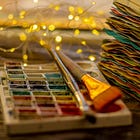



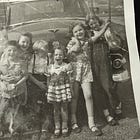
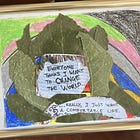

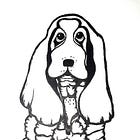
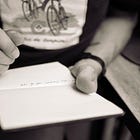
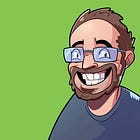
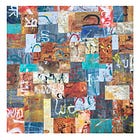








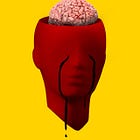
Fascinating